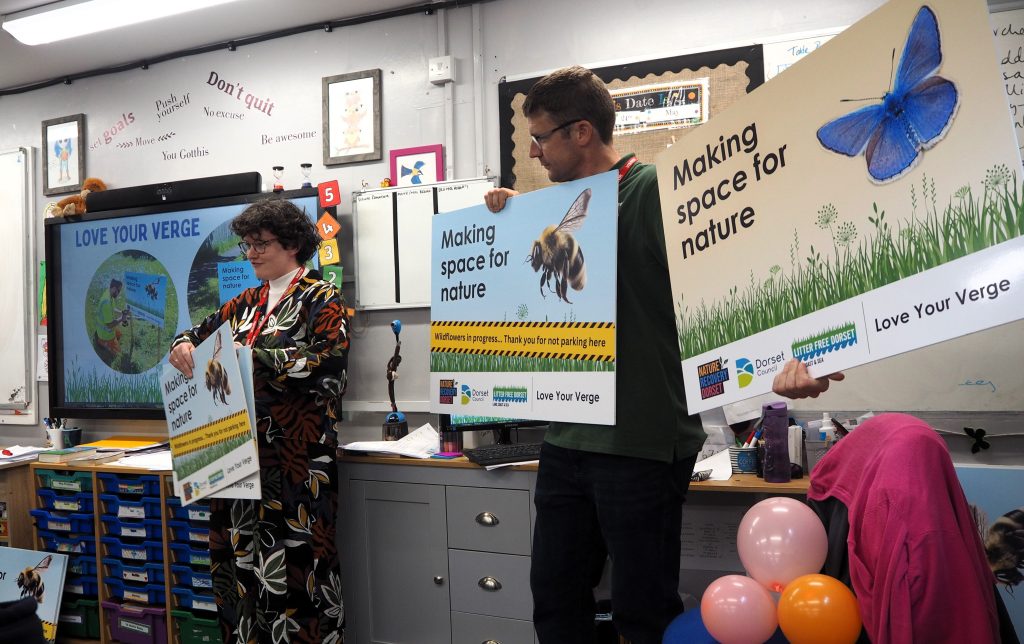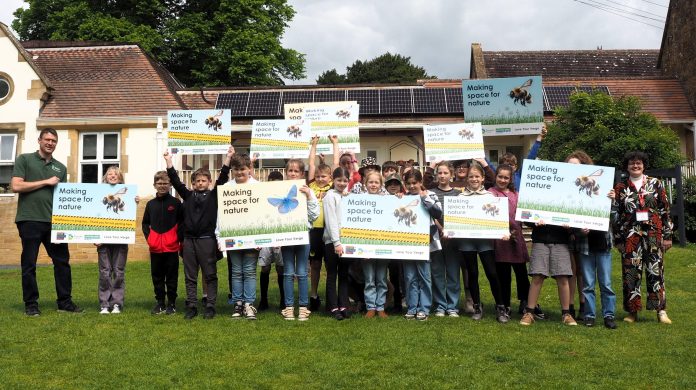This summer, Dorset Council and Litter Free Dorset will be celebrating Dorset’s roadside verges as havens for biodiversity and wildlife with the ‘Love Your Verge’ campaign.
The campaign raises awareness of the council’s work to increase biodiversity in verges as part of its efforts to make more space for wildlife in the county, whilst making sure junctions and lines of sight are kept clear for road users. This year’s campaign will feature colourful roadside signage with bees and butterflies and the slogan ‘Making space for nature’ to highlight the importance of Dorset’s verges for wildlife.
Over the past few years, changes to verge management in Dorset have meant an increase in cut and collect mowing – a technique which helps to reduce the soil fertility, slowing grass growth rates and creating a better environment for wildflowers.

Where it is safe to do so, the council has also reduced verge cutting throughout its rural road network to allow more flowers to complete their life cycles before being cut. And verges which are already of high value for wildlife, known as ‘conservation verges’, are managed to ensure biodiversity can continue to thrive each year. This approach benefits insects such as bees and butterflies by providing essential food sources for these pollinators, supporting their survival and reproduction. Moreover, the diverse habitats along roadside verges serve as important breeding grounds and corridors, enhancing their populations and contributing to overall ecosystem resilience.
These conservation efforts form part of a wider initiative to recover nature across Dorset. Dorset Council is currently working, alongside BCP Council and Natural England, with residents, communities and organisations to create a plan which will help grow, improve, and connect nature locally.
This new local nature recovery plan will join up the wonderful work already taking place across the county and highlight where more work is still needed to help nature thrive. This will be crucial in helping Dorset reach its ‘30 by 30’ goal, a target set by the UK Government which aims to see 30 per cent of land, rivers, and seas protected for nature by 2030.
Councillor Nick Ireland, Dorset Council’s leader and cabinet member for Climate Change and Environment, said:
“By championing the significance of our county’s roadside verges as sanctuaries for wildlife, the ‘Love Your Verge’ campaign is a great demonstration of Dorset Council’s commitment to increasing biodiversity in our county through everything we do.
“As a council we recognise that the nature crisis and climate emergency are closely connected. And whilst the impact of a changing climate is driving nature’s decline, taking steps to restore nature now can help to tackle the climate crisis we face.”
Verges are increasingly known as important areas for wildlife, and the work in Dorset is leading the way nationally. The Wildlife Trust already recognise a number of verges in Dorset as Sites of Nature Conservation Interest (SNCI), a designation which is given to sites that have substantive nature conservation and geological value. The council aim to establish even more SNCI sites this year, as part of its work to help make more space for nature in the county.
Russell Goff, Greenspace Manager at Dorset Council, said:
“The loss of natural habitats is a major threat for pollinators, which are essential for helping plants and crops to grow. I’m proud of the work my team at Dorset Council do each year, which is helping transform our verges and restore some of these vital habitats.
“Safety remains our top priority, so our approach must strike a balance between cutting verges regularly where needed for visibility and working to protect and enhance Dorset’s natural environment.
“By raising awareness of the important work to encourage and protect the plants and wildlife in our verges, we hope more people will do their bit by choosing to take their litter home and disposing of it responsibly.”
Littering poses significant challenges for wildlife inhabiting Dorset’s verges, leading to costly and time-intensive clean ups. The RSPCA receives around 10 calls a day about animals harmed by litter, with an increase during summer. How we dispose of our rubbish greatly impacts wildlife, especially wild birds, and mammals such as hedgehogs.
Dorset’s residents and visitors can report roadside litter and find more information on how the council is managing verges for road users and wildlife, on the Dorset Council website.

Our greenspace team recently visited Symondsbury Primary School to talk about making space for wildlife in our communities.
KEEP US ALIVE and join us in helping to bring reality and decency back by SUBSCRIBING to our Youtube channel: https://www.youtube.com/channel/UCQ1Ll1ylCg8U19AhNl-NoTg AND SUPPORTING US where you can: Award Winning Independent Citizen Media Needs Your Help. PLEASE SUPPORT US FOR JUST £2 A MONTH https://dorseteye.com/donate/







